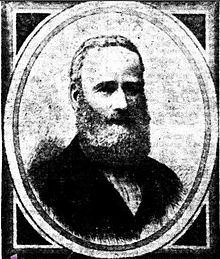James Tyson
|
The Hon James Tyson |
|
|---|---|
 |
|
| Member of the Queensland Legislative Council | |
|
In office 23 May 1893 – 4 December 1898 |
|
| Personal details | |
| Born |
8 April 1819 Cowpastures, New South Wales, Australia |
| Died | 4 December 1898 (aged 79) Darling Downs, Queensland, Australia |
| Resting place | Toowoomba Cemetery |
| Nationality | Australian |
| Occupation | Pastoralist |
| Known for | Australia's first self-made millionaire |
James Tyson (8 April 1819 – 4 December 1898) was an Australian pastoralist. He is regarded as Australia's first self-made millionaire. His name became a byword for reticence, wealth and astute dealing.
James Tyson was born about 1820 in the Camden district (then called Cowpastures) of New South Wales, the son of William Tyson and Isabella Marie (née Coulsen). There is disagreement over the date of his birth. Some sources say 11 April 1823 while others say 8 April 1819. At his death in 1898, he was described as being either 75 years of age or 81 years of age, suggesting an even wider range of possible birth dates.
His mother, Isabella, was a convict, sentenced to transportation for theft. His father, William, and his eldest brother, also William, came with her. Receiving a grant from Governor Lachlan Macquarie in the Narellan area, the Tysons set themselves up as small farmers, later moving with their growing family to East Bargo. As a youth James commenced work for neighbours such as Major Thomas Mitchell, and John Buckland who contracted him to take cattle to the north-eastern border area of the colony of Victoria. Then, with his brothers, he took up squatting licences in western New South Wales. Eventually they settled on land at the junction of the Lachlan and Murrumbidgee Rivers, in the reed-beds which had defeated John Oxley's exploration in 1837.
The legendary Tyson fortune was founded on success in butchering on the Bendigo goldfields. It was extended by canny buying, knowledge of cattle and of stockroutes, pastoral lending and the judicious selection of enormous leaseholds to provide a chain of supply which stretched from North Queensland to Gippsland and which fed beef to Melbourne, Sydney and Brisbane. It is on record that on one occasion he offered the Queensland government a loan of £500,000 towards the cost of constructing a proposed transcontinental railway, and in 1892 at a time of economic depression he took up £250,000 in treasury bills to assist the government.
...
Wikipedia
